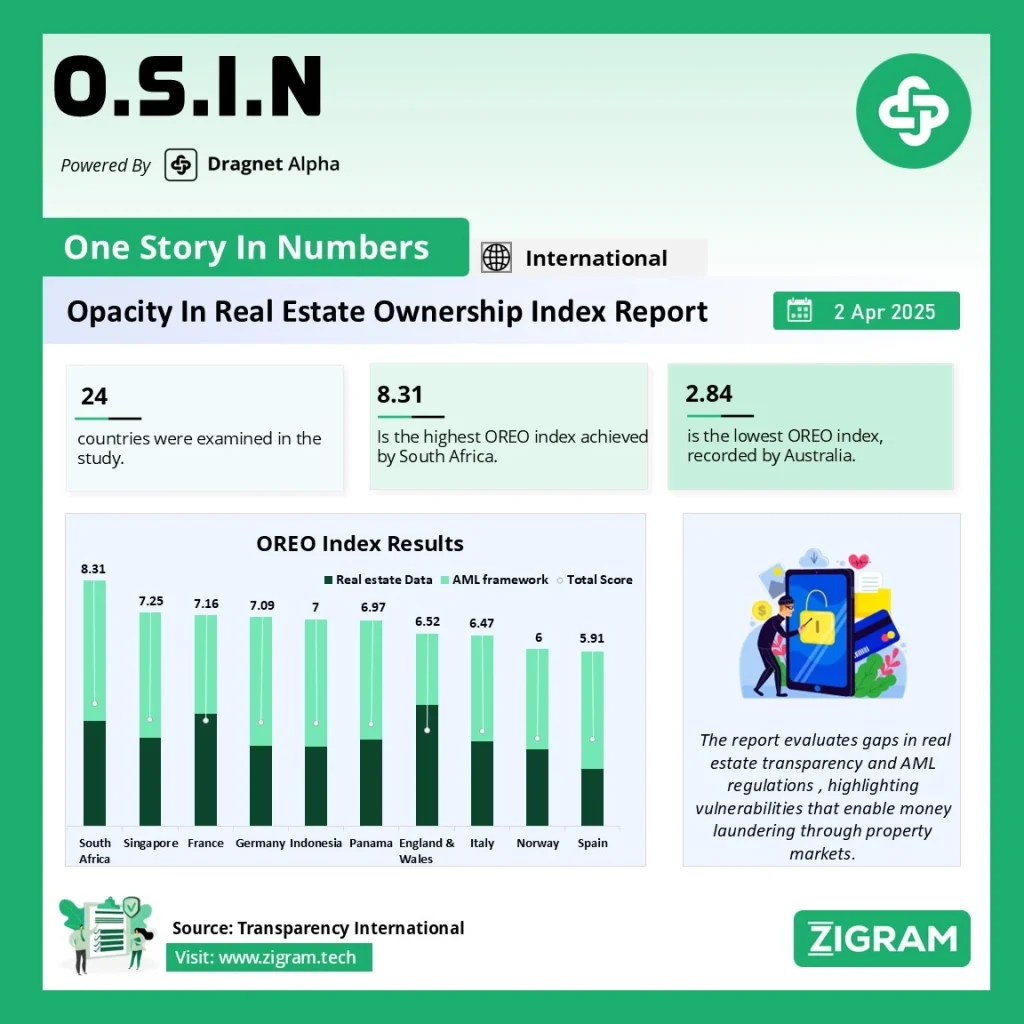Global Real Estate Vulnerabilities: The OREO Index Exposes Loopholes
The Opacity in Real Estate Ownership (OREO) Index highlights significant weaknesses in the global property market, which make it vulnerable to money laundering and illicit financial activities. Despite international AML (Anti-Money Laundering) standards, many of the world’s largest economies and key financial hubs continue to have loopholes that allow criminals to launder their wealth through real estate investments.
Assessing Real Estate Transparency and AML Frameworks
The OREO Index evaluates 24 jurisdictions, including G20 nations, financial hubs like Singapore and Hong Kong, and other regions, based on two critical factors:
• Real Estate Data Transparency: The availability and adequacy of real estate ownership data.
• AML Regulations in Real Estate: The strength and scope of AML frameworks applied to property transactions.
The findings reveal that no jurisdiction fully meets the ideal standards for transparency and regulation, leaving significant gaps that criminals can exploit.
Key Findings: Gaps in Transparency and Regulation
1. Poor Availability of Real Estate Data
• While most jurisdictions record some ownership details, information on the actual beneficial owners of companies buying real estate is often missing or inaccessible.
• Many countries do not require foreign companies to declare their beneficial owners when purchasing property.
• Real estate registers in Argentina, China, Germany, Türkiye, and the UAE (except specific financial zones) are not publicly accessible.
• Mexico and other countries have fragmented data systems, with some regions not even providing digital property records.
• Few jurisdictions provide bulk, machine-readable data, making it difficult to analyze suspicious ownership patterns.
2. Real Estate Transactions Often Evade AML Scrutiny
• In countries like Australia, China, England & Wales, Japan, Türkiye, and the UAE, property transactions can occur without oversight by professionals subject to AML obligations.
• Only four countries (Germany, Singapore, South Africa, and Spain) ensure that real estate transactions are fully monitored under AML regulations.
• In several jurisdictions, real estate developers are not subject to AML laws, even though they directly sell properties.
• Countries like India, Canada, and Panama have weak oversight due to exemptions, fragmented supervision, and client confidentiality rules.
3. Cash Transactions Create Additional Risks
• Only a few jurisdictions—France, Hong Kong, the UAE, and Germany—have strict regulations on how real estate transactions should be conducted.
• Many countries still allow high-risk buyers to use cash, gold, or crypto to purchase properties, increasing money laundering risks.
Even Top Performers Have Weaknesses
The top-ranking jurisdictions—South Africa, Singapore, and France—still have vulnerabilities:
• South Africa: Comprehensive property data is collected but is not freely accessible to non-citizens.
• Singapore: Some beneficial ownership data is recorded, but real estate data is not openly available.
• France: Provides transparent corporate property ownership data but allows foreign companies to buy real estate without registering locally.
Recent Reforms and the Need for Global Action
While some countries, such as Panama, South Africa, and the UAE, have implemented reforms following scrutiny from the Financial Action Task Force (FATF), these measures remain incomplete and require better enforcement.
The OREO Index calls for stronger global initiatives to close loopholes in real estate ownership and AML frameworks. Organizations like FATF, the Organisation for Economic Co-operation and Development (OECD), and the United Nations are pushing for greater beneficial ownership transparency and standardized regulations for professionals in the real estate sector.
Conclusion
As real estate remains a prime target for financial crime, it is crucial for policymakers, financial watchdogs, and law enforcement agencies to strengthen transparency, enforce AML regulations, and eliminate loopholes. Without decisive action, criminals will continue exploiting property markets to launder illicit wealth, undermining global efforts to combat financial crime.
Read the full report here.
Please read about our product: Dragnet Alpha
Click here to book a free demo
- #MoneyLaundering
- #RealEstate
- #FinancialCrime
- #AML
- #OREOIndex
- #Transparency
- #Corruption
- #Compliance
- #G20
- #FATF
- #OECD
